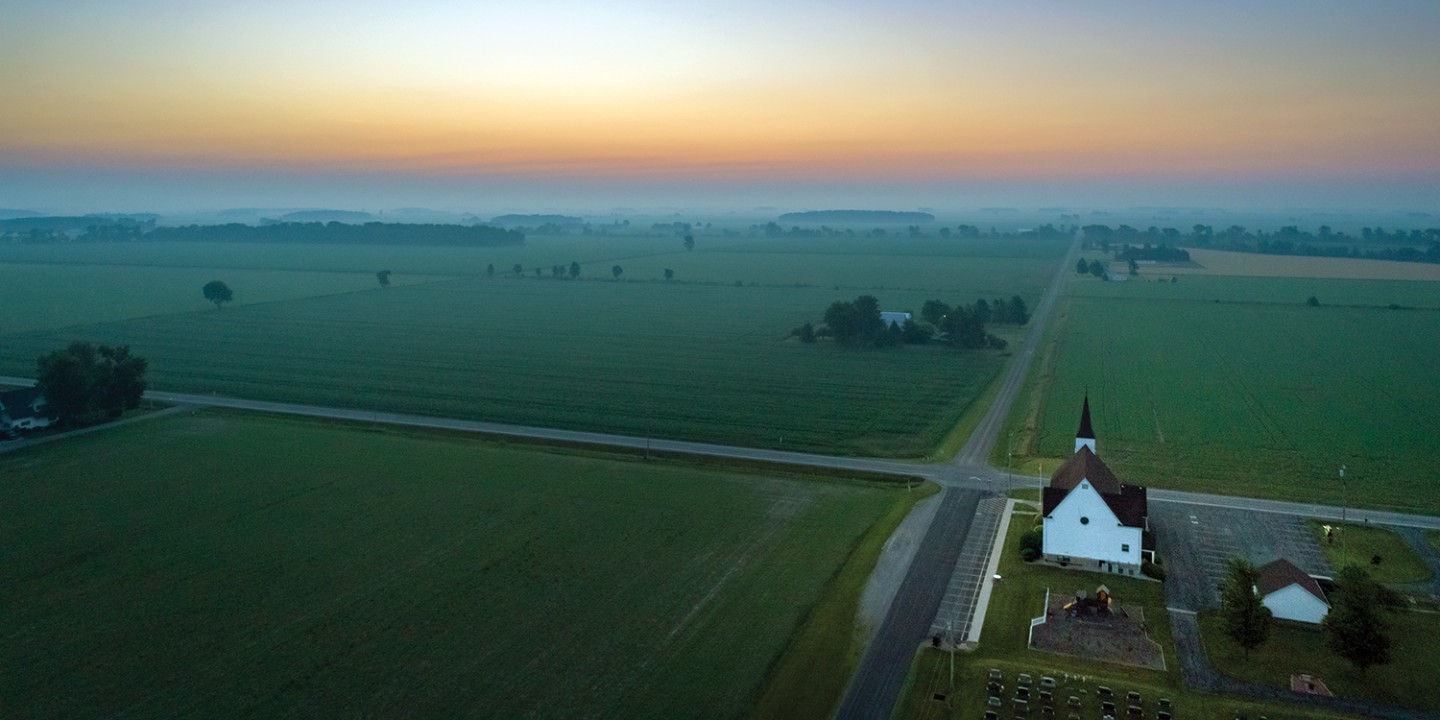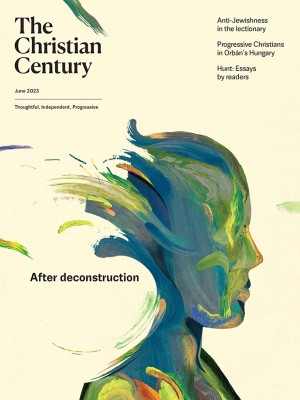Burnout and resilience in the wilderness
Many rural pastors like me are finding Jesus in the desert places.

(Photo by Nicholas Smith / iStock / Getty)
You know you’re in trouble when your colleague recommends their antidepressants.
I was a midlife pastor coming down the pandemic’s awful crest when things started to fall apart for me. It wasn’t that I lost my faith. I loved the church and (mostly) loved ministry. But everything at once swamped the baseboards of my life, and my ministry sagged. That’s when I found myself talking to a couple of pastoral colleagues—and when it became clear that this time something was different. I couldn’t name it just then, but I was experiencing pastoral burnout.
I know I’m not alone. We could try to explain the rise of pastoral burnout by rehearsing all the glass splinters of the last few years—the pandemic, the politics, the mask wars. We could acknowledge that the problem has in fact been with us much longer. But it does seem like something is up. We pastors all lost our mojo at once.
Read our latest issue or browse back issues.
I set out to understand how the slow-burn epidemic of pastoral burnout has played out across the unique contours of my corner of the church: the rural church. I talked to pastors and other leaders from across a theological and geographical spectrum of rural America. I wanted to know what they were seeing—and what resources they were mustering.
I discovered that whatever’s going on among rural pastors is more complicated than the narratives of the Great Resignation might suggest. Although many pastors may have considered resigning, at least among the rural leaders I’ve talked to, it doesn’t seem like everybody’s quitting. One judicatory leader told me that he thinks the pastors he oversees—most of them in rural Pennsylvania—have demonstrated remarkable resilience. Other leaders I spoke with noted that pastors were retiring early, returning to retirement after a stint pitching in, or transitioning to a parallel career—like nursing home chaplaincy. Some moved to another church.
Yet what seems clear is that many pastors came close to the edge, experiencing some level of spiritual and emotional fatigue and vocational burnout.
The World Health Organization defines burnout as an “occupational phenomenon” characterized by “feelings of energy depletion or exhaustion; increased mental distance from one’s job, or feelings of negativism or cynicism related to one’s job; and reduced professional efficacy.” People experiencing burnout doubt that their work matters, and they disconnect from it.
For pastors, there’s an obvious spiritual component to burnout. We’re the original practitioners of “bring your whole self to work.” Work is vocation is self, so when work gets wobbly, everything shakes.
For me, burnout felt like entering a desert. My soul was wrung out. My pastor heart was dry after some astringent criticisms of my ministry. I just needed a win, but instead I found myself wandering in “trackless wastes” (Ps. 107:40).
The desert of rural burnout has its own distinct geography. However we understand rural, one defining feature is the sparsity of people. In the rural church, that sparsity can translate into a heavy sense of smallness, isolation, and the fear of missing out.
The smallness of rural communities can provoke a feeling of being incessantly observed, with the subsequent need to be “on” as a pastor. It’s wearying. “Everyone walks on eggshells,” one pastor told me. What’s more, pastors of small and declining rural congregations often perceive a constant pressure to make the church grow.
Rural congregations can also be tremendously isolating. Educational opportunities, services, internet access, and peers can be unavailable or far-flung. The denominational office is off in a city somewhere. Even arriving at the church can be a GPS-bending, dirt road experience. Add to this the impression among many rural pastors that their values and convictions stand conspicuously at odds with those of the local community, and the sense of isolation is complete. Out here, only the coyotes can hear us cry.
And rural pastors can experience a pervasive sense of FOMO. It can sometimes feel that the engines of cultural production and success are located elsewhere—somewhere, no doubt, with a downtown and better coffee.
Perhaps FOMO is just the sin of vainglory dolled up in modern garb—the niggling sense that we’re destined for greatness but got trapped in a backwater. Yet I suspect that for most rural pastors and leaders, FOMO arises not from the belief that we’re owed something but from a sense of futility. We do the work with the people, but sometimes success doesn’t come. Have we missed God’s call? Are we just pouring water on the desert?
And yet the desert isn’t always a bad place. In the scriptures, the desert is the site of both struggle and refuge. It’s in the desert that the people of Israel know scarcity (Exod. 16:3). But it’s also in the desert that God feeds them on the bread of angels (Ps. 78:25).
No doubt this is why at a key moment in his kingdom mission, Jesus takes his disciples to the desert. “Come away to a deserted place all by yourselves and rest a while,” Jesus says. The apostles need a break from the voracious crowd; “they had no leisure even to eat” (Mark 6:31). It is in that desert place that Jesus ministers to his ministers. He takes, blesses, breaks, and gives the loaves, split 5,000 ways, “and all ate and were filled” (6:42). We come to a place beyond ourselves where we realize only Jesus can sustain us.
Embracing the desert is an act of humility: there are some things we can make happen, but other things we cannot. Rural communities and congregations have their limitations, and the desert’s grace is allowing us to acknowledge them gently. In this way, the desert is a feature, not a bug, of the pastoral vocation.
I encountered Jesus’ power to sustain me in the desert places when I launched a living room eucharistic gathering. My congregation is accustomed to sharing communion infrequently, and I had a hunger that couldn’t be met once a quarter. I needed Jesus bread and Jesus wine at the table Jesus lays. So I cajoled my wife and a couple of friends to give it a try. We began meeting once a month to celebrate a short liturgy I had purpose-built for our gatherings and then feast together around the table.
It saved my ministry. Jesus showed up at that table, and it was grace and grace and thanksgiving and grace, month in and month out, me settling into myself as he gave himself. Around the dinner table, we’d talk life, work, and parenting. Something happened in that little church gathering as Jesus worked his rhythms into our lives. It turned out that one of the couples was divorced and had only recently begun the tender, tentative journey of reconnecting. When they asked me to remarry them, we planned a low-key living room service around our simple altar. We prayed for our kids’ struggles. I led four of the teenage boys in catechism and baptism. Now I sometimes discover our three-year-old absent-mindedly singing the Agnus Dei as he rolls his cars across the carpet. What is this confluence of sacred and ordinary? I was hungry for it all in a way that surprised even me: communion and community.
The disciples are together in the desert, a little community centered around the bread-breaker Jesus: 12 times one but also 12 times 12. Community mends what disillusionment isolates. Part of what our little eucharistic community was mending in me was a sense of Jesus’ accompaniment. This is my body. This is my blood. Jesus kept showing up in this place at this time. I knew this theological truth intellectually, but I had to experience Jesus’ self-giving presence afresh to continue forward. Having a beer with supportive friends didn’t hurt, either.
So much of how we experience the desert places depends on who we journey with. There’s burnout, and then there’s burnout. If we’re listening to the voice of those who love us—and above all the voice of God—then sometimes burnout can be a kind of creative destruction, a sign that it’s time for a change. It’s all too easy to ask, with the cynical voices of Psalm 78:19, “Can God spread a table in the wilderness?” What takes more courage is to hold open our empty hands to the Jesus who walks with us in—and sometimes insists on leading us into—the desert.





